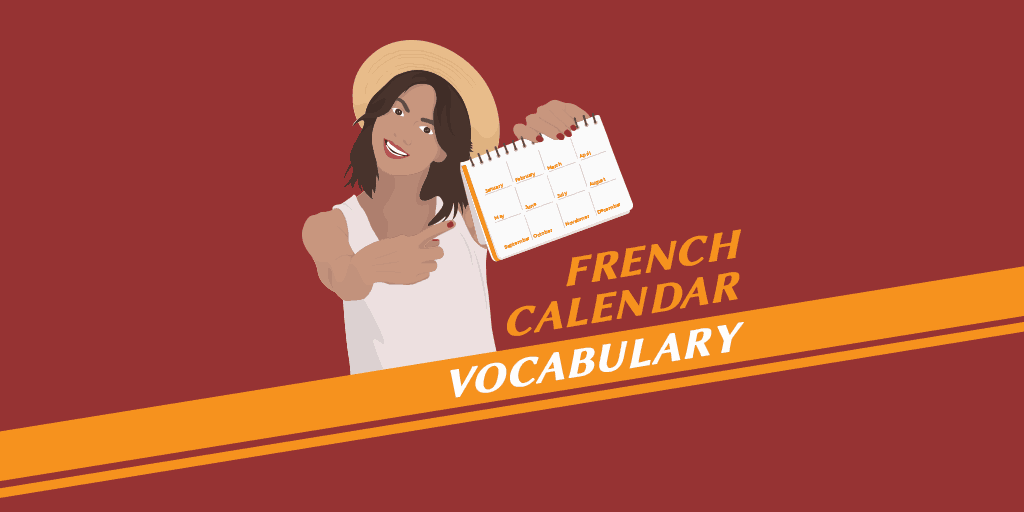It’s another year, a new chance to get things right, and a whole new set of twelve months to look forward to! If you’re learning French, you need to know how to say the days and months in French, as well as be able to say the dates.
That’s something we’ll remedy in this article. Here, let’s talk about the calendar in French or le calendrier.
Start studying the French calendar here...
A Day in French
Let’s begin with a single day (un jour).
| un jour | a day |
| aujourd'hui | today |
| demain | tomorrow |
| hier | yesterday |
| le matin | morning |
| l'après- midi | afternoon |
| le soir | evening |
| la nuit | night |
Take note that the French word for afternoon is exactly worded out the same way in English.
Après means after
Midi means noon
So après-midi is literally afternoon!The Days of the Week in French
Next up, we have the days of the week or les jours de la semaine.
| les jours | the days |
|---|---|
| les jours de la semaine | days of the week |
| lundi | Monday |
| mardi | Tuesday |
| mercredi | Wednesday |
| jeudi | Thursday |
| vendredi | Friday |
| samedi | Saturday |
| dimanche | Sunday |
| la semaine | the week |
| le week-end | the weekend |
Let me tell you an interesting fact about the calendar in French.
If you could notice, the names of the days of the week in French are based on the different god and goddesses.
Lundi is named after Luna, the Roman goddess of the moon. Mardi comes from Mars, the Roman god of war. Then there’s mercredi from Mercury, jeudi for Jupiter, and vendredi for Venus.
Other things to remember:
The Months in French
Now let’s talk about the different months and what they’re called in French.
| un mois | a month |
| janvier | January |
| février | February |
| mars | March |
| avril | April |
| mai | May |
| juin | June |
| juillet | July |
| août | August |
| septembre | September |
| octobre | October |
| novembre | November |
| décembre | December |
Did you notice something? Just like the days of the week, the names of the months in French are also written as all small letters. In French, we do not capitalize the first letter of the name of the month.
Dates in French
One important thing you need to know is that the dates in French are said as a cardinal number.
For example:
Example: It’s the first of December.All of which mean “It’s August 5”.
One exception for this is the first day of the month which is always referred to as le premier, an ordinal number.
C’est le premier décembre.
Learn more about cardinal and ordinal numbers in French in this article!
How to talk about years in French
Now we’re down to the years. When talking about a year in French, you either use ‘an’ or ‘année’.
Examples:
You can also simply say:
En 1990. In 1990.
Take note that if you simply say c’est + year ending in zero such as 2000, people can confuse it with a price or amount of something.
C'est l'année 2018. It’s the year 2018/ It’s 2018.
Other simpler options:
How to say the date in French
Use the following format:
LE + NUMBER + MONTH + YEAR
Some examples:
Pop Quiz!
Test your knowledge of the lesson we discussed by answering a few questions below:
1. What does this mean? Aujourd’hui, nous sommes dimanche
Click to reveal correct answer
2. True or false: le 12 janvier is July 12.
Click to reveal correct answer
3. How do you say Wednesday in French?
Click to reveal correct answer
Conclusion
So there you go with the days, months, and year in French. Now you can finally talk about the different dates in the calendar in French.
Want more simple lessons like this? Get your copy of Beginner’s French Grammar in 30 Days. It comes with easy-to-follow lessons, audio, quizzes, and exercises plus a lot more. Check it out below!
Here are some FAQs about French Calendar
On what day does a French calendar begin?
The French use the Gregorian Calendar, which starts on the 1st of January.
What was the calendar during the French Revolution?
What are the 12 months of the year in French?
Janvier, février, mars, avril, mai, juin, juillet, août, septembre, octobre, novembre, décembre.
